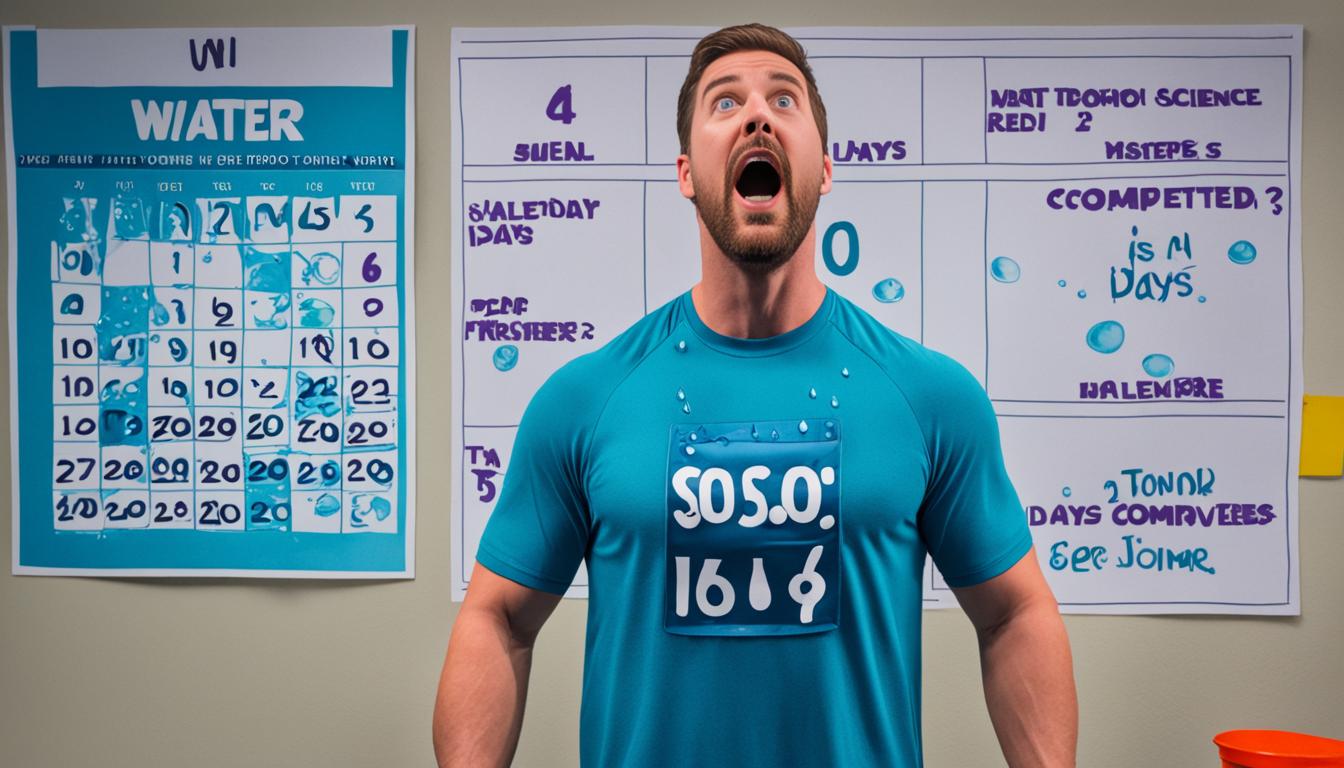Water fasting has become more popular as a way to lose weight and improve health. It means not eating or drinking anything except water for 24-72 hours. Some people do it for spiritual reasons, while others believe it helps with detox, calorie control, and better health.
But, it’s important to be careful and know the risks before trying water fasting. Not preparing or knowing how can lead to dehydration, imbalances in electrolytes, and serious health issues for some.
Before starting, talk to a doctor to make sure it’s safe for you. It’s also key to learn how to handle hunger, stay hydrated, and safely end your fast. This helps avoid risks and gets the most out of it.
Key Takeaways:
- Water fasting involves consuming only water for a set period, typically 24-72 hours.
- Potential benefits may include weight loss, detoxification, and improved health markers.
- Risks include dehydration, electrolyte imbalances, and complications for certain individuals.
- Consulting with a healthcare professional before starting a water fast is crucial for safety.
- Proper preparation, hydration, and post-fast food reintroduction are essential for minimizing risks.
What is Water Fasting?
Water fasting means not eating or drinking anything except water for a while. People usually drink only water for 24 to 72 hours. Some may even fast for weeks. This method is popular for its health benefits, helping with weight loss, and fighting chronic diseases.
Definition and Basic Concept
Water fasting is simple: you don’t eat or drink anything with calories, just water. This break lets your body focus on fixing cells and cleaning itself. While fasting, your body starts to use fat for energy instead of glucose.
History and Reasons for Water Fasting
Water fasting has been around for centuries, linked to many religions and spiritual beliefs. It’s seen as a way to clean the body and mind, connect with something greater, and practice self-control. Now, people also see it as a way to improve health, including:
- Promoting weight loss
- Reducing inflammation
- Improving insulin sensitivity
- Stimulating autophagy (cellular repair and regeneration)
- Lowering the risk of chronic diseases such as diabetes, heart disease, and certain cancers
Water fasting has many benefits, but it’s important to be careful. It can be risky, especially for people with health issues or on certain medications. Always talk to a doctor before starting a water fast to make sure it’s safe for you.
Benefits of Water Fasting
Water fasting is becoming more popular as a way to improve health and well-being. It may help with hormone balance, ketosis, stress relief, and better insulin and leptin sensitivity. But, we need more studies to fully understand its effects.
Potential Weight Loss
Many people think water fasting can help with weight loss. When you don’t eat, your body uses stored fat for energy. This can lead to losing weight. A study found that 72% of people who fasted for 48 hours felt hungry, tired, and had trouble sleeping. This could mean their body was switching to ketosis, a fat-burning state.
Autophagy and Cellular Repair
Water fasting can trigger autophagy, a process where the body cleans and repairs cells. After 58 hours of fasting, researchers found more health-related metabolites. This suggests water fasting might help keep cells healthy and extend life.
Reduced Inflammation and Chronic Disease Risk
Water fasting might also lower inflammation and reduce the risk of diseases like diabetes and heart disease. It can make insulin work better, which helps prevent type 2 diabetes. It also affects hormones that control hunger and metabolism, like leptin.
| Health Benefit | Mechanism of Action |
|---|---|
| Weight Loss | Burning stored fat for energy during fasting |
| Autophagy | Cellular repair and recycling of damaged components |
| Reduced Inflammation | Modulation of inflammatory pathways and hormones |
| Improved Insulin Sensitivity | Enhanced responsiveness to insulin, lowering diabetes risk |
Water fasting has many potential benefits, but it’s not right for everyone. It can be risky if not done right. Always talk to a doctor before starting a water fast to make sure it’s safe for you.
Risks and Precautions for Water Fasting
Water fasting can have health benefits, but it’s important to know the risks and precautions. Before starting, talk to a healthcare professional, especially if you have health issues or take medicines.

Dehydration and Electrolyte Imbalances
Dehydration is a big risk of water fasting. Even though you drink water, you might not get enough electrolytes like sodium and potassium. This can cause dizziness, headaches, and low blood pressure.
A 2022 study found that almost half of 48 men and women stopped fasting after 10 days due to side effects like headaches and fatigue.
Potential Muscle Loss
Water fasting can make your body use muscle for energy, leading to muscle loss. This is a big concern for those who are already thin or have little muscle. A 2021 study showed that 12 middle-aged men lost muscle mass after 8 days of fasting.
Increased Risk for Certain Medical Conditions
Fasting can make some health issues worse, like gout, diabetes, and eating disorders. People with these conditions should not fast. Also, those who are underweight, recovering from surgery, or have chronic kidney disease should avoid it.
Even fasting under a doctor’s watch for up to 2 days can cause side effects like fatigue, nausea, and headaches.
| Risk | Symptoms and Consequences |
|---|---|
| Dehydration and Electrolyte Imbalances | Dizziness, headaches, low blood pressure, fatigue |
| Potential Muscle Loss | Decreased muscle mass, particularly in lean individuals |
| Increased Risk for Certain Medical Conditions | Exacerbation of gout, diabetes, eating disorders; not recommended for underweight individuals or those recovering from surgery or illness |
Water fasting has benefits, but it’s important to think about the risks and talk to a healthcare professional before starting. Other types of fasting, like intermittent fasting, can also be beneficial. They can help with weight loss and improve blood sugar and blood fats, and they might even help with brain health without the risks of long-term water fasting.
Who Should Not Attempt Water Fasting
Water fasting can be good for health, but it’s not for everyone. Kids, teens, older folks, pregnant women, nursing moms, and those with chronic illnesses should be careful with it.
Kids and teens need nutrients to grow right. Water fasting can lead to missing out on these nutrients. Older adults might face risks like dehydration and imbalances in electrolytes because of their age.
Pregnant women and nursing moms need more nutrients for their babies. Water fasting can be risky for both mom and baby by cutting out essential nutrients. They should talk to their doctors before fasting.
People with chronic illnesses like diabetes, heart disease, kidney disease, or eating disorders should not fast without a doctor’s watchful eye. Fasting can make these conditions worse, leading to serious problems.
| Group | Reason for Avoiding Water Fasting |
|---|---|
| Children and adolescents | Require consistent nutrients for growth and development |
| Older adults | More susceptible to dehydration and electrolyte imbalances |
| Pregnant women | Increased nutritional demands for fetal development |
| Nursing mothers | Need to maintain a balanced diet for milk production |
| Individuals with chronic illnesses | Fasting can exacerbate underlying health conditions |
It is essential to consult a healthcare professional before starting any fasting regimen to determine if it is safe and appropriate for your individual health status.
Knowing the risks and your health needs helps you decide if water fasting is good for you. If you’re in a high-risk group, try other ways to get healthy like eating well and exercising.
Preparing for Your Water Fast
Before starting your water fasting journey, it’s key to prepare well. Doing so can greatly improve your fasting results and health. Here are some steps to help you prepare.
Consulting with a Healthcare Professional
Getting medical supervision is a must before a water fast. A healthcare provider can check if fasting suits your health and goals. This is vital if you have health issues or take medicines that fasting might change.
Transitioning Your Diet Before the Fast
Before your fast, start eating more plant-based and whole foods. Eat small, easy-to-digest meals like fruits, veggies, and whole grains. Drop processed foods, sugar, and caffeine to ease your body into fasting.
Choosing the Right Time and Duration
Picking the right time and length for your fast is key. Try to fast during a low-stress period when you can rest and avoid hard work. Start with a 24-hour fast and increase the time as you get more comfortable.
Short-term fasts of 1-3 days can be beneficial for health. Longer fasts (over 3 days) should be under a doctor’s watch.
Here’s a guide to fasting times and their benefits:
| Fasting Duration | Potential Benefits |
|---|---|
| 16-20 hours | Improved insulin sensitivity, weight loss |
| 24-48 hours | Autophagy, growth hormone increase |
| 48-72 hours | Immune system regeneration, reduced inflammation |
Remember, fasting affects people differently. Listen to your body and adjust your fasting plan as needed. Proper preparation makes your water fast safe and rewarding.
Water Fasting for Beginners: What You Need to Know Before You Start
Before you start your water fasting journey, it’s key to know what to expect and how to prepare. As a beginner, having realistic expectations and the right supplies can greatly improve your fasting experience.
Setting Realistic Expectations
Starting a water fast means you might face challenges, especially in the first few days. Hunger, fatigue, and other side effects are common for beginners. But, by setting realistic expectations, you can handle these better.
Here are some fasting guidelines to keep in mind:
- Start with a short fast of 24-72 hours to see how your body reacts
- Be ready for side effects like headaches, dizziness, and feeling tired
- Remember, most weight loss is from losing water, not fat
- Understand that fasting can be tough on your mind and feelings
Essential Supplies and Resources
Having the right supplies and resources is key for a successful water fast. Here are some must-haves:
| Supply | Purpose |
|---|---|
| Pure water or distilled water | Stay hydrated with clean water |
| Reusable water bottle | Have water easily accessible all day |
| Electrolyte supplements | Replenish minerals lost during fasting |
| Comfortable clothing | Help you relax and rest during the fast |
| Motivational books or resources | Give you support and inspiration to stay on track |
Having a supportive environment and motivational resources also helps. Consider joining online forums, reading fasting books, or connecting with others who fast for support and encouragement.
Preparation is crucial for a successful water fast. By setting realistic expectations and getting the right supplies, you’ll be ready to face challenges and enjoy the benefits of water fasting.
During Your Water Fast
Starting a water fast means taking care of yourself and listening to your body. You might feel thirsty, hungry, dizzy, or weak. These feelings are normal and will lessen as your body gets used to fasting.
Staying Hydrated with the Right Amount of Water
Drinking enough water is key to a successful water fast. Try to drink 2 to 3 liters of water a day. Drink water slowly and steadily, not all at once. If you’re not sure how much water you need, talk to a doctor or check out this guide on water fasting.
Managing Hunger and Cravings
It’s normal to feel hungry and crave food during a water fast, especially at first. Here are some tips to help you:
- Drink a glass of water to help control hunger and feel full.
- Do some light activities like meditation, deep breathing, or yoga to take your mind off food.
- Take a break and rest, as hunger often goes away when you’re relaxed.
- Think about the benefits of water fasting, like cell repair and less inflammation.
Monitoring Your Body’s Response
Pay attention to how your body feels during your water fast. Some discomfort is okay, but watch out for severe symptoms like:
- Extreme tiredness or weakness that makes it hard to do daily tasks
- Constant dizziness or feeling lightheaded
- Nausea or vomiting
- Fast heartbeat or chest pain
- Feeling confused or disoriented
If you have any of these symptoms or don’t feel right, stop your fast and get medical help if needed. Always put your health and safety first during a fast.
Water fasting can be a powerful experience, but be careful and aware. Stay hydrated, handle hunger wisely, and watch how your body reacts. This way, you can make your water fast easier and enjoy its benefits.
Breaking Your Water Fast Safely
After your water fast, it’s key to break it safely to avoid health risks. A big worry is refeeding syndrome, a serious condition from too many nutrients too fast. It’s vital to ease back into solid foods carefully.
Reintroducing Solid Foods Gradually
Start with small amounts of easy-to-digest foods to avoid digestive issues. Great choices include:
- Fruits: Watermelon, papaya, and berries are great because they’re high in water and have soft fiber.
- Vegetables: Steamed or lightly cooked veggies like spinach, broccoli, and carrots are packed with nutrients and easy to digest.
- Whole grains: Small amounts of cooked quinoa, brown rice, or oatmeal provide important nutrients and fiber.
- Lean proteins: Adding small amounts of chicken, fish, or tofu helps with muscle recovery and keeps you full.
Slowly increase your food portions and variety over the next few days. Pay attention to how your body feels and what it needs.
Choosing Nutrient-Dense, Easily Digestible Options
Focus on foods that are both nutritious and easy on your stomach when breaking your fast. Here are some good choices:
| Food Category | Examples | Benefits |
|---|---|---|
| Fruits | Watermelon, papaya, berries | High water content, gentle fiber, antioxidants |
| Vegetables | Spinach, broccoli, carrots | Nutrient-rich, easy to digest, fiber |
| Whole Grains | Quinoa, brown rice, oatmeal | Essential nutrients, fiber, satiety |
| Lean Proteins | Chicken, fish, tofu | Muscle recovery, satiety, amino acids |
Remember, the key to safely breaking your water fast is to take it slow, listen to your body, and focus on nourishing yourself with healthy, easily digestible foods.
By slowly adding solid foods and choosing foods rich in nutrients, you help your body adjust to eating again. This approach reduces the risk of stomach problems or other health issues.
Incorporating Water Fasting into a Healthy Lifestyle

Water fasting can be a great addition to a healthy lifestyle. It’s important to remember to also focus on regular exercise, managing stress, and eating well between fasts. A study showed that 84% of people felt better after fasting, showing its benefits when part of a full wellness plan.
For a safe and effective approach, try intermittent fasting like the 16/8 or 5:2 methods. These allow you to enjoy fasting’s benefits without the downsides of long fasts. By eating during certain times, you can lose weight, improve insulin sensitivity, and lower inflammation. A 10-day water fast can lead to a 7kg weight loss, with most of it in the first three days.
When not fasting, eat a diet full of fruits, veggies, whole grains, lean proteins, and healthy fats. This diet gives your body the vitamins and nutrients it needs. Exercise is also key for staying healthy, helping with muscle, heart health, and mood. Try to get at least 150 minutes of moderate or 75 minutes of vigorous exercise each week, as advised by the U.S. Department of Health and Human Services.
“Water fasting, when combined with healthy diet and lifestyle changes, has been found effective for weight loss.” – Recent research findings
Managing stress is vital for your health. Chronic stress can cause high blood pressure, anxiety, and depression. Using techniques like meditation, deep breathing, or yoga can reduce stress and improve your well-being.
Adding water fasting to a plan that includes a balanced diet, regular exercise, and stress management can enhance its benefits. Always talk to a healthcare professional before starting any fasting plan to make sure it’s right for you.
| Lifestyle Factor | Recommendation |
|---|---|
| Diet | Balanced, nutrient-dense whole foods |
| Exercise | 150 minutes of moderate or 75 minutes of vigorous exercise per week |
| Stress Management | Meditation, deep breathing, yoga |
| Fasting Approach | Intermittent fasting (16/8 or 5:2) for sustainability |
Alternatives to Water Fasting
For those who find water fasting too hard or risky, there are other fasting methods. These options offer many benefits of fasting but are easier on the body. They are also more sustainable over time.
Intermittent Fasting
Intermittent fasting (IF) means eating only during certain times. For example, the 16/8 method is 16 hours of fasting followed by 8 hours of eating. Or, the 5:2 diet limits calories for two days a week. This method can help with weight loss, improve insulin sensitivity, and reduce inflammation.
A 2020 review found that people with weight issues lost 0.8% to 13% of their starting weight with IF. But, IF might not help as much for women, as it could affect menstrual cycles. Always talk to a doctor before starting any fasting plan.
Juice Fasting
Juice fasting is another option, where you drink fruit and vegetable juices but eat less solid food. It gives your body important nutrients and fiber. Choose juices that are fresh and low in sugar for the best results.
Juice fasting can help your digestive system, support detox, and increase your intake of plant compounds. But, remember it still cuts calorie intake. Be careful with it, especially if you have health issues or a history of eating disorders.




